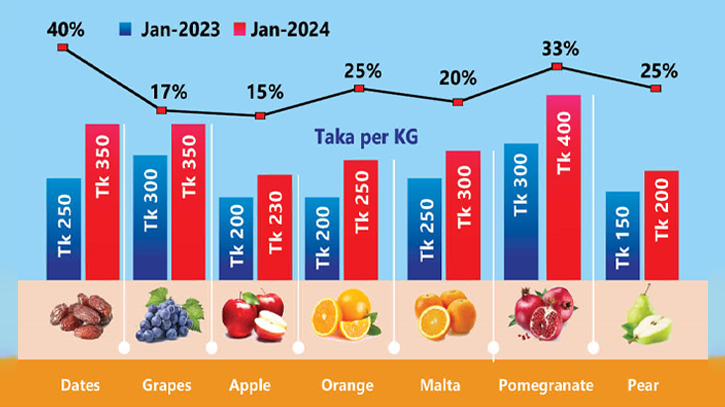
Photo: Daily Messenger
Unscrupulous traders have started increasing the prices of fruits, including dates and grapes, well before of the upcoming holy month of Ramadan.
According to the market insiders, syndicates are said to be manipulating prices, attributing the hikes to difficulties in opening LCs (Letters of Credit) due to a shortage of dollars. Importer traders, who purchased fruits at lower prices two to three months ago and stockpiled them, are now justifying the price surge.
As a consequence, the consumer-level price of dates in the capital has risen from Tk 50 to Tk 150 per kg within just two weeks. Grapes have seen an increase of Tk 50 per kg, and prices of apples, oranges, and malt are also on the rise.
Ashiquzzaman, a retail fruit trader in Mouchak, stated that traders follow a pattern of raising prices through syndicates every year before Ramadan. This year, importers have initiated price hikes for dates and grapes, raising concerns about potential increases in the prices of other fruits.
Ashiq shared his experience, noting that he had to purchase a box of normal dates from Badamtali for Tk 1,500, causing the per-kg purchase price to drop to Tk 300. He expressed concern that the prices of various types of dates have surged.
Highlighting the rapid increase in grape prices, he mentioned that within two days, the price had escalated by Tk 50 per kg. A box of green grapes, which cost Tk 2,800 a week ago, is now being purchased for Tk 3,000.
Ashiq further said that there is a potential for further increases in date prices with the onset of Ramadan.
According to the Bangladesh Fresh Fruits Importers Association (BFFIA), around 50 thousand tones of dates are needed for Iftar during the fasting month, and more than 50 thousand tones have already been imported. Prime Minister Sheikh Hasina has directed a reduction in import duties on dates in response to the situation. She also ordered an LC for fruits used in fasting, including apples, dates, and grapes.
This correspondent investigated various markets in the capital and discovered that dates are currently being sold for Tk 330 to Tk 350 per kg, a significant increase from Tk 200 per kg just a month ago and Tk 250 per kg a year ago. Slightly better quality dates were retailed at Tk 500 to Tk 550 per kg, up from Tk 400 to Tk 430 per kg a month ago and Tk 350 to Tk 380 per kg a year ago. This indicates a general rise in prices ranging from Tk 100 to Tk 300 per kg over the past year.
Traders in Karwan Bazaar revealed that prices started gradually increasing after last year`s Ramadan, and some dates have more than doubled in price in two years.
Yusuf, a retail fruit trader, commented on the substantial price hikes by importers or wholesale traders in recent months. For instance, green apples are now being sold at Tk 230 per kg, compared to Tk 200 per kg a month ago and Tk 200 per kg a year ago. White apples are priced at Tk 200 per kg, up from Tk 180 per kg a month ago.
“Ahead of Ramadan, traders have also increased the price of grapes, with medium-quality grapes retailing at Tk 350 to Tk 380 per kg, black grapes at Tk 400 per kg, and red grapes (imported from India) at Tk 250 per kg,” added Yusuf.
The investigation also revealed the following prices for various fruits: oranges were sold between Tk 200 and Tk 250 per kg (small oranges at Tk 180 to Tk 200 per kg), kenua (orange-like fruit) Tk 170 and Tk 190 per kg, Malta between Tk 300 and Tk 350 per kg (compared to Tk 220 to Tk 250 per kg a year ago), Pomegranate between Tk 350 and Tk 400 per kg and pears between Tk 200 and Tk 230 per kg.
According to the Trading Corporation of Bangladesh (TCB), on January 30, dates were being sold in the capital for prices ranging from Tk 250 to Tk 450. Comparatively, on the same day last year, dates were sold for Tk 150 to Tk 450. This indicates a significant increase of Tk 100 per kg for middle-quality edible dates.
Sirajul Islam, the president of the Bangladesh Fresh Fruits Importers Association (BFFIA), informed The Daily Messenger that the month of Ramadan witnessed increased fruit consumption, with dates constituting 40 to 50 percent of sales.
He highlighted the challenge of increased costs associated with importing dates, citing a fixed price of $2500 per ton set by the Chittagong Custom House, regardless of the actual import cost ranging from $900 to $1000 per ton. Consequently, customs duty, VAT, and regulatory duty have also surged, contributing to higher container-emptying costs.
The elevated duties have subsequently led to an increase in the retail price of dates in the country. To maintain a normal market for dates during Ramadan, traders are urging authorities to revert to the previous customs price and import duty.
"Due to the continuous increase in commodity prices, people are suffering," says Ghulam Rahman, the President of the Consumers Association of Bangladesh (CAB).
“Now, even before the arrival of Ramadan, the prices of fruits are rising, making it difficult for ordinary people to afford. As a result, purchasing power for common people is diminishing. If the government reduces the tariffs on imports, including dates and other essential commodities, perhaps prices will decrease. Otherwise, people might be forced to go without eating," added Ghulam.
Messenger/Alamin








